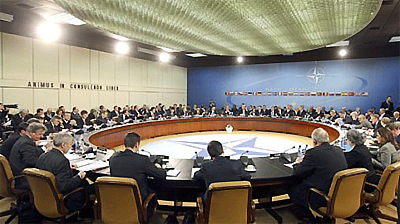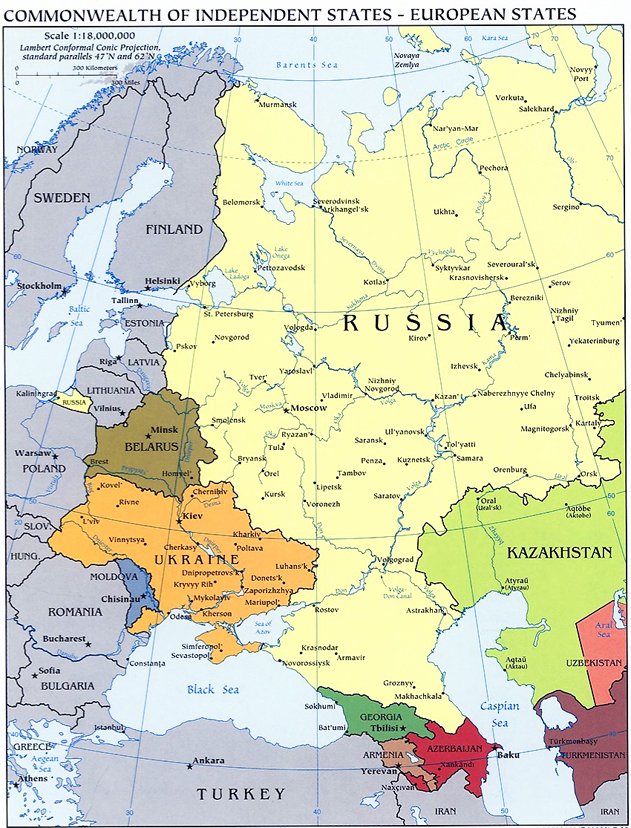NATO Is Ready for Russia Tactics, Estonia Minister Says

(Bloomberg – bloomberg.com – Ott Ummelas – May 7, 2014) NATO is prepared to counter non-conventional warfare used by Russia to annex Crimea, Estonian Defense Minister Sven Mikser said.
The North Atlantic Treaty Organization’s 1949 founding treaty “can be effectively used to counter new threats” and doesn’t need to be revised, Mikser said in an interview yesterday in the Estonian capital, Tallinn. The former Soviet republic, which shares a border with Russia and has a Russian-speaking minority, has “full confidence” in the accord’s article that commits members to collective defense.
“There was an element of surprise that these little green men surfaced in Crimea,” said Mikser, 40, referring to unidentified gunmen wearing military uniforms who seized key installations on the Black Sea peninsula before Russia annexed it from Ukraine. “I think this kind of surprise can be effectively used only once. We, or anyone, will be prepared to respond to a scenario like this.”
The U.S. and its allies accuse Russia of fomenting unrest in Ukraine’s easternmost regions. While President Vladimir Putin has refrained from direct military intervention, he has vowed to defend Russian speakers. NATO members with such minorities may not be prepared to counter new military threats from Russia based on events in Ukraine, according to Janis Berzins, head of the Center for Security and Strategic Research of the National Defence Academy of Latvia.
Russian Deployments
In the run-up to the March referendum that paved the way for Crimea switching hands, the Kremlin denied military involvement beyond its naval base on the peninsula. Even so, Putin last month said Russian troops had ensured the safety of the vote. NATO estimates that the country has 40,000 soldiers stationed near the Ukrainian border.
Estonia’s government is considering “a package of measures” to boost defense and security expenditures, Prime Minister Taavi Roivas said in parliament today. The country now spends about 2 percent of gross domestic product on its military.
The country’s military may lack rapid-reaction capabilities and needs to adjust to new threats based on evidence from the events in Crimea, Martin Hurt, deputy director of the International Center for Defense Studies in Tallinn, wrote in a report Apr. 17.
‘Creates Confusion’
Russia has the “ability to incite revolts and unrest on foreign soil while rapidly deploying military forces to aggravate and exploit the resultant political turmoil,” Hurt wrote. “This creates confusion in determining what countermeasures to resort to, leaving the country being attacked with minimal time to implement them.”
Such new-generation warfare shows the need for a more comprehensive national-security strategy, Berzins of the Latvian defense academy wrote in a paper last month.
Estonia has already made such preparations, Riho Terras, the chief of the country’s armed forces, said at a conference in Tallinn on Apr. 26.
“We have put a lot of emphasis in the last years to create units that are able to deal with unconventional threats,” Terras said. The government needs to have clear crisis procedures and be legally prepared “to take a swift decision to shoot and kill the first green man and the second one won’t come.”
‘Serious Counterbalance’
Putin may target the Baltic and Balkan regions after Ukraine if the U.S. and its allies fail to show “serious counterbalance,” Mikhail Khodorkovsky, the former Yukos Oil Co. owner freed from jail last year, said in an interview with Lithuanian daily Lietuvos Rytas published today.
In an effort to reassure NATO members in the region, the alliance has bolstered its presence in the Baltic countries and Poland. It added warplanes for air patrols and surveillance and deployed about 600 U.S. paratroopers for exercises.
Even so, the newest members that joined in the past decade are pushing for permanent bases.
NATO has to adjust to having “very little if any warning time” from Russia, where decision-making is centralized, Mikser said. A revision of long-term plans for defense and military exercises would boost security in the Baltic region, which the Kremlin views as the alliance’s “soft underbelly,” he said.
“Russia’s conventional military is still far inferior to NATO collectively and they know that,” Mikser said. “But the modernization effort that they have undertaken in the last few years has delivered a Russian military capable of acting against individual neighboring countries.”
Article ©2014 Bloomberg L.P. All Rights Reserved. Article also appeared at bloomberg.com/news/2014-05-07/nato-is-ready-for-russia-tactics-estonia-minister-says.html

